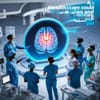Artificial intelligence (AI) is transforming the healthcare industry in various ways, from streamlining administrative tasks to enhancing patient care. While AI has the potential to save hundreds of thousands to millions of lives and reduce healthcare costs by up to $360 billion annually, its integration into healthcare systems is happening gradually.
AI-powered chatbots can handle appointment scheduling, triage common patient questions, and automate tasks like clinical documentation and coding. AI also assists doctors in diagnosing diseases, predicting patient outcomes, and developing personalized treatment plans. Additionally, AI analyzes large datasets to identify high-risk patients, predict hospital readmissions, and optimize resource allocation.
Medical imaging is another area where AI is making a significant impact. AI algorithms can detect diseases like cancer and cardiovascular conditions from medical images with high accuracy. Furthermore, AI helps tailor treatment plans to individual patients based on their genetic profiles, medical histories, and lifestyle factors.
Despite the potential benefits, integrating AI into existing healthcare systems is complex and requires significant investments in technology, training, and infrastructure. Concerns about data privacy, algorithmic bias, and liability also need to be addressed.
As AI technology matures, its adoption in healthcare is expected to grow, leading to more efficient and effective care. AI will play a crucial role in developing tailored treatment plans and predicting patient responses to different therapies. With AI-powered predictive analytics and clinical decision support systems, medical errors will be reduced, and patient outcomes will improve.
The future of AI in healthcare looks promising, but it's essential to address the challenges and concerns associated with its integration. By doing so, we can unlock the full potential of AI and improve the healthcare system as a whole.


